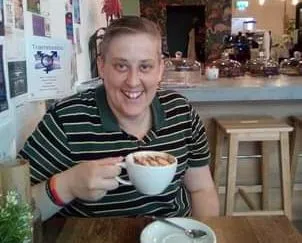Trans man forced to endure horrific conditions in women’s prison explains why it’s vital we start reinvesting in inmates

Dalton Harrison at Flamingos Coffee House in Leeds, an LGBT-friendly, late-night and alcohol-free cafe. (Supplied)
Dalton Harrison, 40, is a transgender man who spent a year behind bars in women’s prisons in the UK. Since getting out, the former inmate has advocated for trans rights in prisons and called for better education for prisoners. Dalton writes for PinkNews on his experience in prison and making changes to the system.
I had spent my whole life fighting other people’s ideas of me.
I was so scared of losing my family and friends; so I felt like I had nothing else to lose once they knew I was in trouble with the police. This gave me the courage to transition officially. But after waiting four years for the system to find me guilty of my crime, all I ended up doing was arguing with the criminal justice system about who I was.
When I was sentenced, I found prison was even worse.
“So you are what? Transgender?” A group of women circled me. I looked past their heads to the CCTV cameras, and further away still to an office – its door shut.
“So are you a man changing into a woman?”
I had come out as transgender to my family but had been charged in my dead name. My legal team had told me that attending court in a three-piece suit was not appropriate. They took me in a side room as I passed men with tracksuits getting called to go in.
“I don’t think your look is bad. But you are a woman. The jury likes to put things in a box they don’t understand lesbian or transgender. They are scared of what they don’t understand. Off the record. I am just helping you.”
‘I questioned whether it would be better if I died.’
“I am a transgender man.” The women stared blankly back at me, just like the eyes of the nurse on my arrival in the female prison.
“What do you want me to do about it?” the nurse had said. “Go see a doctor.”
All my fears had formed lungs and beating chests as I listened to staff respond to me. “What do you want to be a butch girl for? There’s plenty in here.”
The gym staff began barking out orders as we were counted and penned in. “Ladies get changed, get a shower. No excuses.”
I got pushed along to a small room. Like school rooms. Years of hiding. That moment. Led to that night. I lay there numb, questioning whether it would be better if I died.
Some prisoners shouted at me as I moved between officers’ observation boxes. You never felt more alone but watched at the same time.
“You think you’re a man. You ain’t nothing but a boy,” they screamed.
Hardship and adversity was meant for people who hadn’t committed crimes. Yet each day I told myself I wasn’t my worst mistake.
I was transferred from one female prison in Leeds to one in Durham.
“Transgender? Trying to get special treatment?” A prisoner spat.
‘Who would want to upset a prison full of women by locking up the only shower block?’
The transgender agreement is a voluntary agreement inside prisons that deals with the way trans prisoners are dealt with. This includes living space, shower access and searching policy. The policy doesn’t change much for trans men and seems more for trans women.
They agreed they would lock me into the shower block for privacy. The reality was I rarely had a shower, as who would want to upset a wing full of women for locking up the only shower block? As for not sharing a cell, I could have got a single one through the mental-health team.
I was the only transgender prisoner who had not been accused of sexual assault.
At the transgender meetings held, we discussed officers using dead names daily. Being called “miss” and “gentleman, or whatever you are today”. Not having access to haircuts to ease dysphoria. Having appointments cancelled.
I realised I was the only trans prisoner who had not been accused of sexual assault. I noticed a lot of the women liked to go out with trans men or women, but if they wanted a new relationship they accused them of being inappropriate. Which would be a way of getting them off the wing or worse.
‘Being the change I wanted to see in how prisons treats trans inmates.’
I wanted to be the change the system lacked. I wanted to show the officers I was not their joke or a troublemaker who went against the prison system that ran by two genders.
I started by becoming the first trans listener for Samaritans. Usually, prison security would exclude most trans prisoners due to mental health problems. Durham Samaritans made me feel like a human being who could make a difference.
Durham Samaritans made me feel like a human being.
The inside-out prison exchange programme with Dr Kate O’Brien and Dr Hannah King from Durham University introduced us to Pips, who was working for Stonewall Scotland. I realised I wanted to be an activist and tell people what it’s like to be trans inside prisons.
I felt it was needed after one prison officer opened up about lack of diversity training. He said he didn’t know how to react to anyone LGBT+, and talking helped him understand.
I left prison to Ripon House hostel, where I met Becky who inspired me. Along with Pam’s constant enthusiasm pushed me to apply for university. I am now in my first year and starting testosterone.
No crime is right but nearly all prisoners get out. Maybe it’s time to make mass incarceration about purpose and re-education and begin re-investing – rather than just writing people off.

